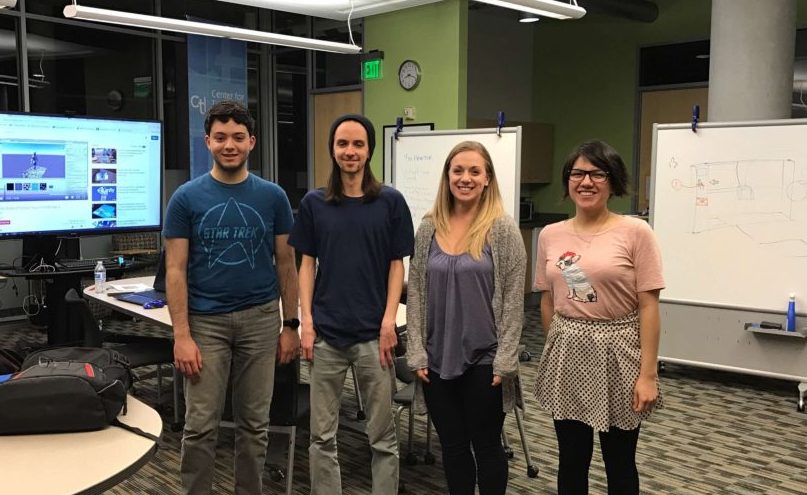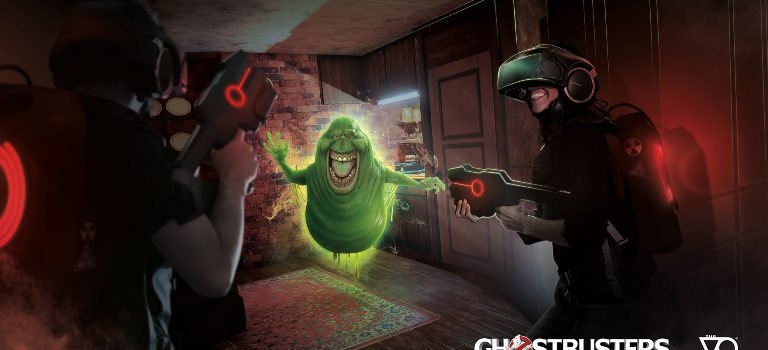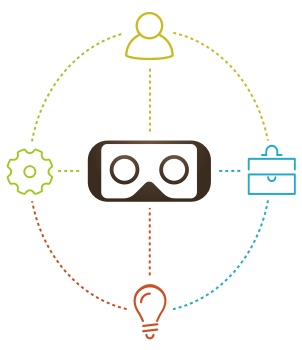
In our first livecast "Student Spotlight" we had the chance to sit down with Boise State University student Audrey Miller-Gatewood. Audrey is a second year student in the Bachelor of Science Gaming, Interactive Media and Mobile Technology program. Audrey is very passionate about virtual and augmented reality and shared her thoughts and insights with us during our interview. If you'd like to connect with Audrey she can be reached via LinkedIn.
Transcription of Live Cast
Annie Morley: Welcome. My name is Annie Morley and I am the president of the Idaho Virtual Reality Council. We are here today at 360immersive doing our live-cast for our student spotlight. I am here with Audrey Miller who is a student at Boise State University in their Gaming Interactive Media and Mobile Technology program. Did I get that right?
Audrey Miller: Yes.
Annie Morley: Okay, good! Welcome, thanks for joining us. We're really excited to have you.
Audrey Miller: That's for having me!
Annie Morley: First off, I'd just like to know a little bit about you, so, tell us about yourself.
Audrey Miller: Well, I'm Audrey. I am a student at Boise State University and I'm studying the science of gaming, interactive media, and mobile technology, as you said. It's a new degree, so it's a little bit of learning going into it for the whole program, but it's a lot of fun.
Annie Morley: Great! What made you decide to choose GIMM as a major? It's a relatively new program, correct? Like you said.
Audrey Miller: Yeah. So, it was kind of interesting how I got involved in GIMM. I was already at the University studying engineering. It wasn't the best fit for me. I was already doing side projects, learning technology for fun, and I found myself distracted in the degree I was currently studying. I was looking at options of either leaving the University, going back to the professional world and working again or if I could find a degree that fit – fit the mold I was looking for.
I was actively involved at the College of Innovation and Design, helping them with a few projects here and there, and discovered the GIMM program. As I discovered the GIMM program and what it was, I met with Anthony Ellertson – he's the director of GIMM. As I met with him, I found out that this was a perfect fit. It would allow me the ability to transfer into the emerging technologies without having a back history in it because I'm transferring from one profession to the next.
It was all project-based learning. It gave me a full portfolio that really helped elevate me from one place to the next, and find my role in the industry. So, it's been really amazing.
Annie Morley: That's awesome. So, you and I have talked a lot before about virtual reality and augmented reality. I know you're really passionate about those areas. You've been able to spend some time in the GIMM program working in both virtual and augmented reality. From that space, tell me a little bit about where you see the biggest opportunities for virtual reality and augmented reality.
Audrey Miller: Well, virtual reality and augmented reality are very different in what type of products they're going to bring. I see virtual reality benefiting a ton in different worlds, like the medical field, and just how we're actually able to help individuals with a mental, a physical state – different areas that – actually, my passion for virtual reality came from that. I had a personal injury where I was meeting with a friend who had a lot of interest in developing a virtual reality application that would help psychologically adjust the thinking.
As I started looking to how it benefits there, I saw how it can help with our jobs, it can help with training in other professions, and just being able to immerse into a world that is – it's very different. Once you first try it, you're like, “Wow.” You come back out of it, you come back to reality, and you're altered. That's amazing to me.
In AR, the augmented reality spaces, there's going to be a ton of merged opportunities. I think the integration of how augmented reality is going to become so natural. I think even the blend of VR and AR, how they're going to eventually have this merge, it's already happening. You've seen the Hololens where you can watch somebody in VR building it right in front of you. They're immersed, but you're watching them in an AR space. They're building it in that – that, to me, is just kind of a cool interaction going on.
Then, just also involving the internet of things. Internet of things is integrating our things to – you know? It just makes everything fluid. We look at the goggles coming out and how I could just be wearing them and I can take care of business as I'm going rather than pulling out my phone – clunky. We're seeing it already in things like SnapChat and other areas. It's just exciting to – it's kind of unknown what markets, but the opportunity to make ease of access and accessibility just is gonna change everything
Annie Morley: Now, you had mentioned that you guys do a lot of project work in the GIMM program –
Audrey Miller: A lot!
Annie Morley: A lot. [Crosstalk] So, tell us a little bit about what is the most interesting project that you've worked on this year or since you've been in the GIMM program, in virtual reality or augmented reality.
Audrey Miller: So, I've worked on, like I said, a lot of different projects. My personal favorite we didn't have a lot of time to invest into, we had another bigger project through the year that was an interactive webcomic. There was an augmented reality comic strip we made that was meant to be a comic strip on paper, but once I pull out my phone and scan it, you would then see an animation pop-up live a video. It was a chance to show employers how you would integrate ad space into your – just to show that connection so that they can even see – we had a theme of mythological. It was very different for me, but it was fun to take a personal thing and put it into that and then make it come to life.
That wasn't my first augmented reality. The other project I did wasn't directly in correlation with GIMM but it still goes hand in hand because it's encouraged by Ellertson. He was saying, “Hey, everyone should be doing this contest and this contest.” So, I have a group I work with very actively, it's the ARVRA, which is the Augmented Reality and Virtual Reality Alliance. We have been together –
Annie Morley: That's at Boise State?
Audrey Miller: It is. It is a recognized org at Boise State. We get together and have been learning together and growing together in both these spaces, as well. We built an AR app that was a live simulation training for 3D printers in the Maker Space at Boise State.
Annie Morley: Oh wow, cool!
Audrey Miller: Yeah. It was for the Boise State Bronco App-a-thon. They named it funny. There was 17 teams, I believe, that competed and we took first place with this.
Annie Morley: That's great! Congratulations.
Audrey Miller: Thank you. It was a lot of fun. We actually had no intentions of trying to win, we were just already going to build this. So, we said, “Great opportunity, spend a weekend together.” We had our first running prototype in six hours.
Annie Morley: Wow.
Audrey Miller: I think that's what helped us become so successful is that we already knew VR, but we didn't know any AR. This was our first time. We're learning. There's a – at the very beginning, there's even photos that they have of us that we were actually learning in the first two hours under a big TV, set it up with YouTube and this and that.
Annie Morley: So, you're just watching YouTube?
Audrey Miller: Yeah! In the first two hours, so it's like –
Annie Morley: Figuring it out.
Audrey Miller: Most of the teams – a lot of them were more advanced in coding. We have a lot of skilled programmers in the group, too. The cool thing about it though is that we learned together, we built it together, and we had a prototype where when we stood up and did our pitch with it, the room was almost silent.
Annie Morley: That's great.
Audrey Miller: Like, “Wow!” That was so easy to watch and use. They're like, “Well, where else can you use this?” I said a live training – think about how that works. You can have that – emergency response teams, for instance. They pull up and they need to be able to access something right away, a training they forgot or they can't remember where something is. They look at – ours was a QR code, but an image that then pops up something – they can push a button and it pops up the resources for them, like that.
You think about ease of access for them –
Annie Morley: The applications are endless.
Audrey Miller: – and how many more lives they could save by having that immediate training or resource available?
Annie Morley: On the spot.
Audrey Miller: Yeah. Before we even knew we won, we were approached by a few people that were like, “I want this.”
Annie Morley: That's so cool!
Audrey Miller: It was cool for us to even see how we did something fun that turned into like, “Wow! This really could be –“
Annie Morley: A really applicable product.
Audrey Miller: Yeah, yeah. It was fantastic, yeah.
Annie Morley: That's so great!
Audrey Miller: That's one – a couple of the few. I have a lot.
Annie Morley: I'm sure the list just goes on and on and on.
Audrey Miller: Well, and the thing about it is you're so – when Professor Ellertson takes you in the first day he says, "I'm going to take over your life," and you're like, "Okay." He means it in a way of you're going to be so invested or not. If you're not, you're going to want to leave and that's great because this isn't the fit for you. But, if you invest yourself into these projects, you're going to grow not only as a person, but in the industry, and be an innovator.
So, that's kind of the cool thing. He really forces you to say, "Okay, I'm fully invested in this program!" Then he goes, "Oh, and there's all these extracurricular things that you can go do, and you should be doing them on top of all of this."
Annie Morley: Great!
Audrey Miller: It's fantastic, yeah.
Annie Morley: That's awesome. Well, thank you so much for sharing a little bit about your experience. We're excited to have you as an IVRC member. We'll definitely have you back at more events.
Audrey Miller: I'll be there.
Annie Morley: Thank you so much for joining us today, and we will be back soon with another live-cast.



Recent Comments